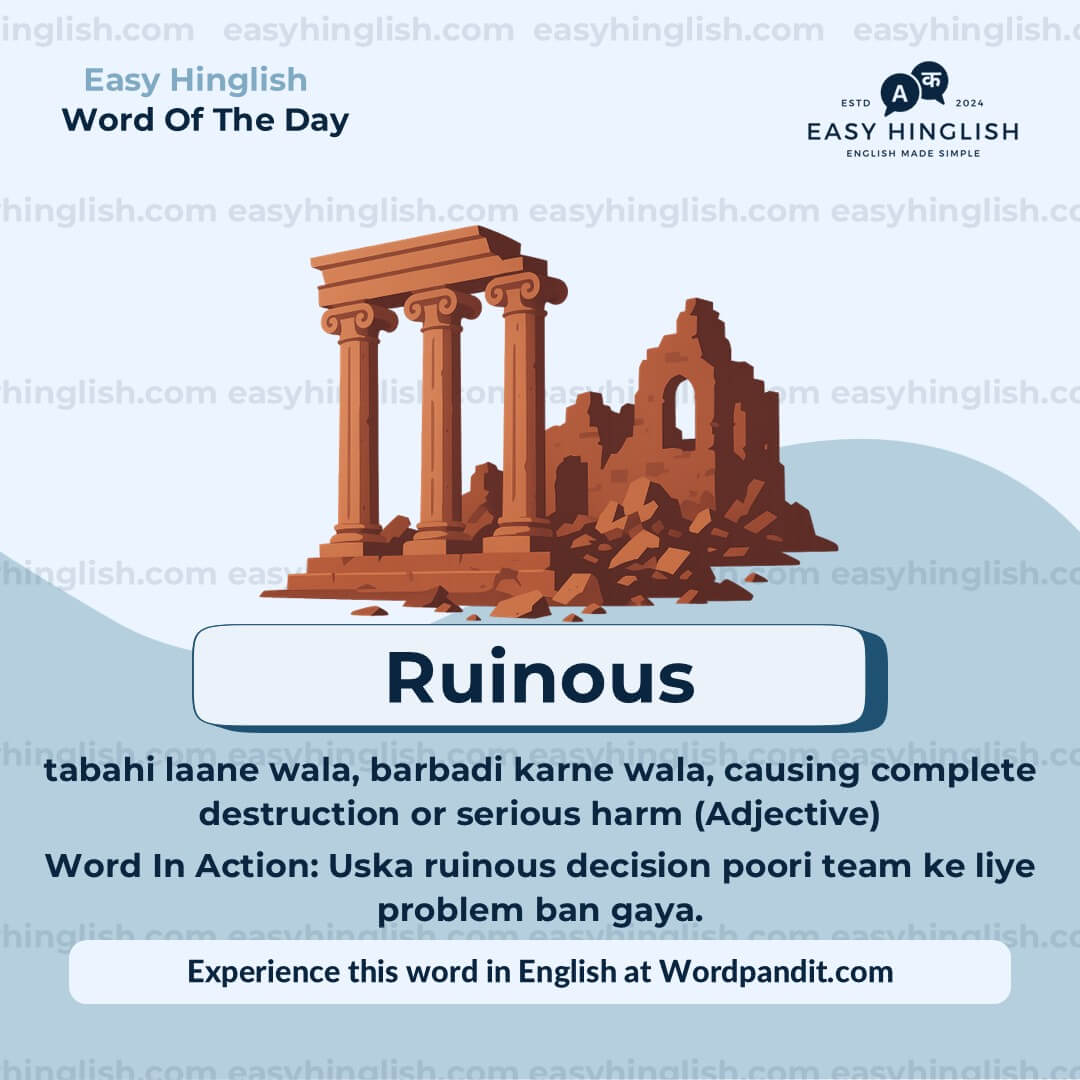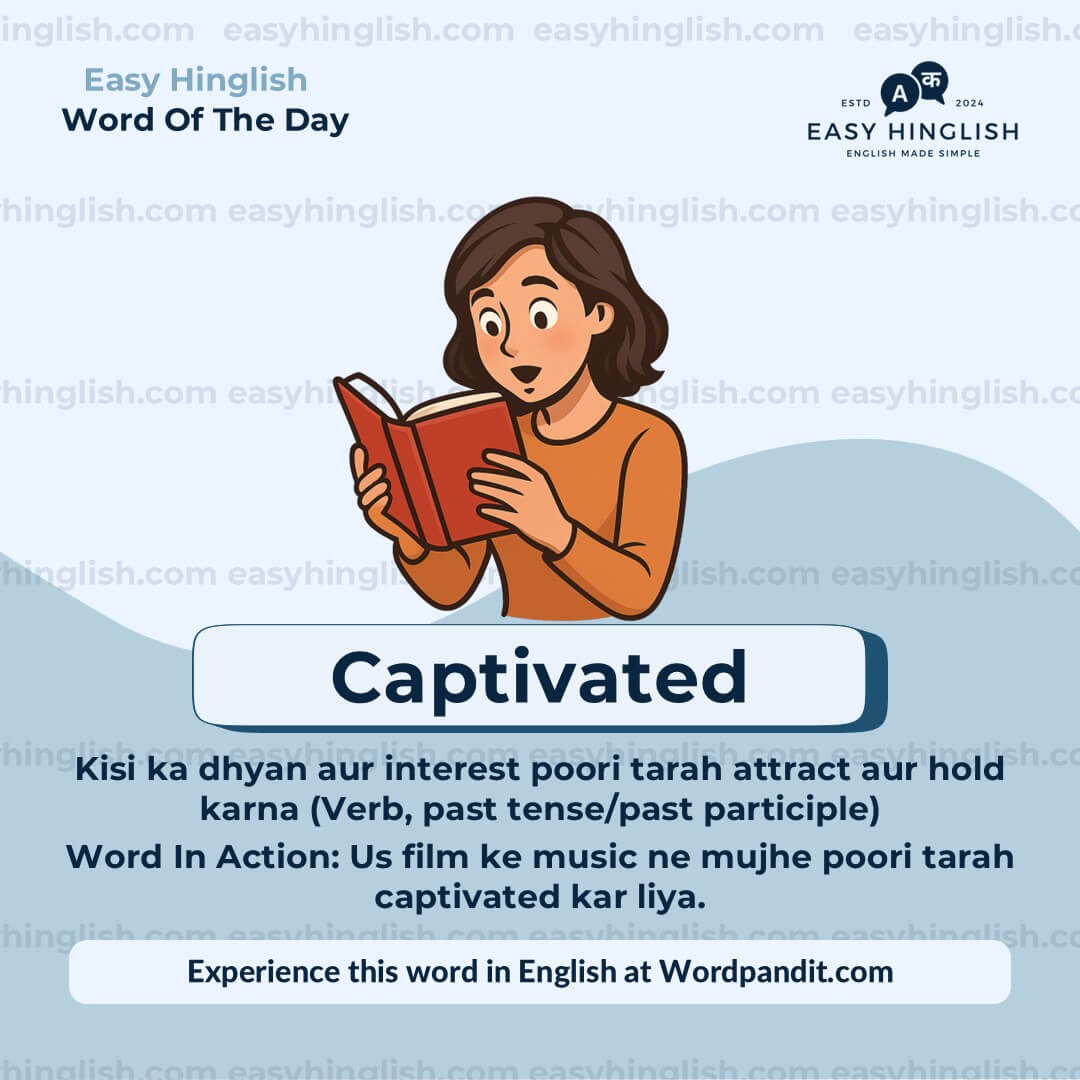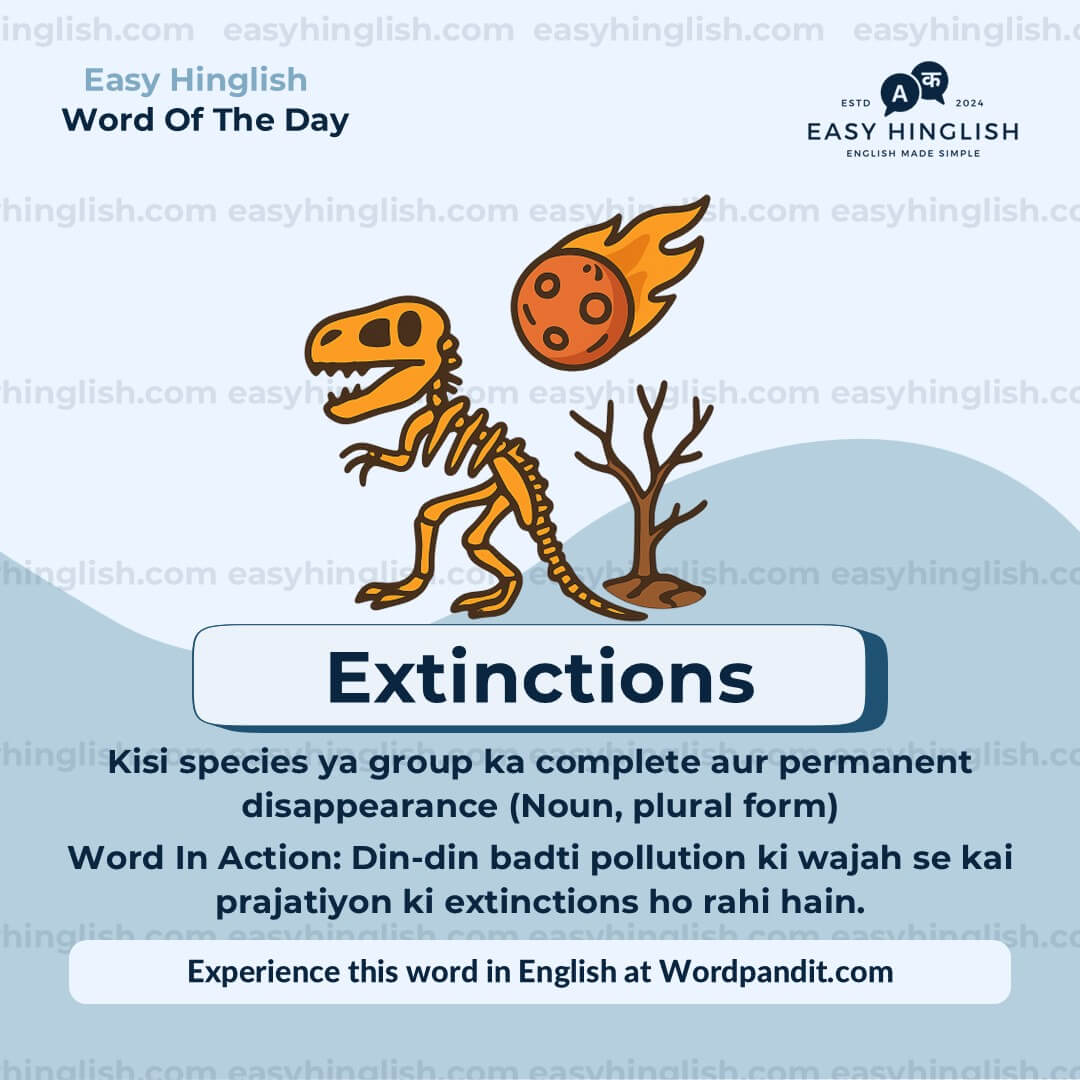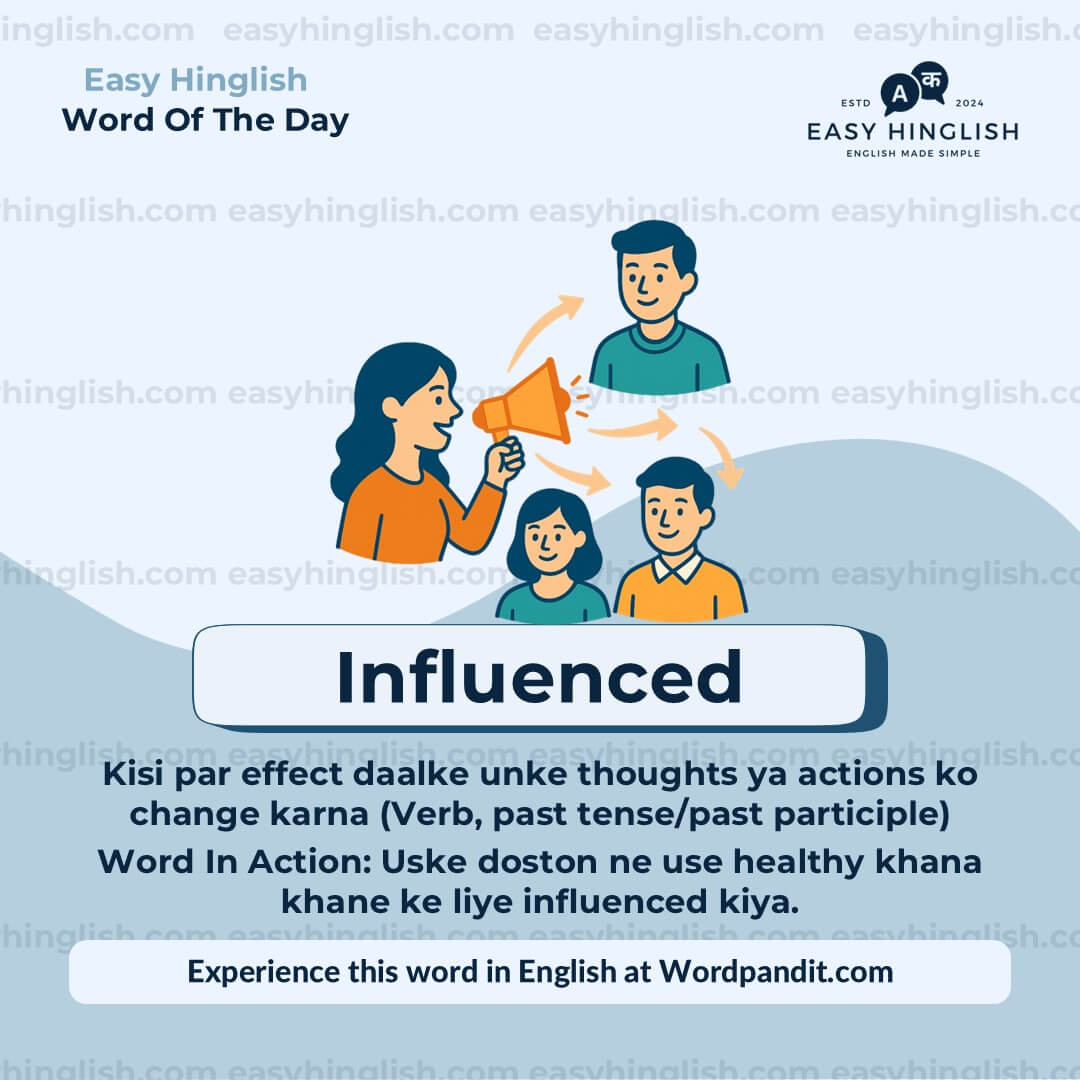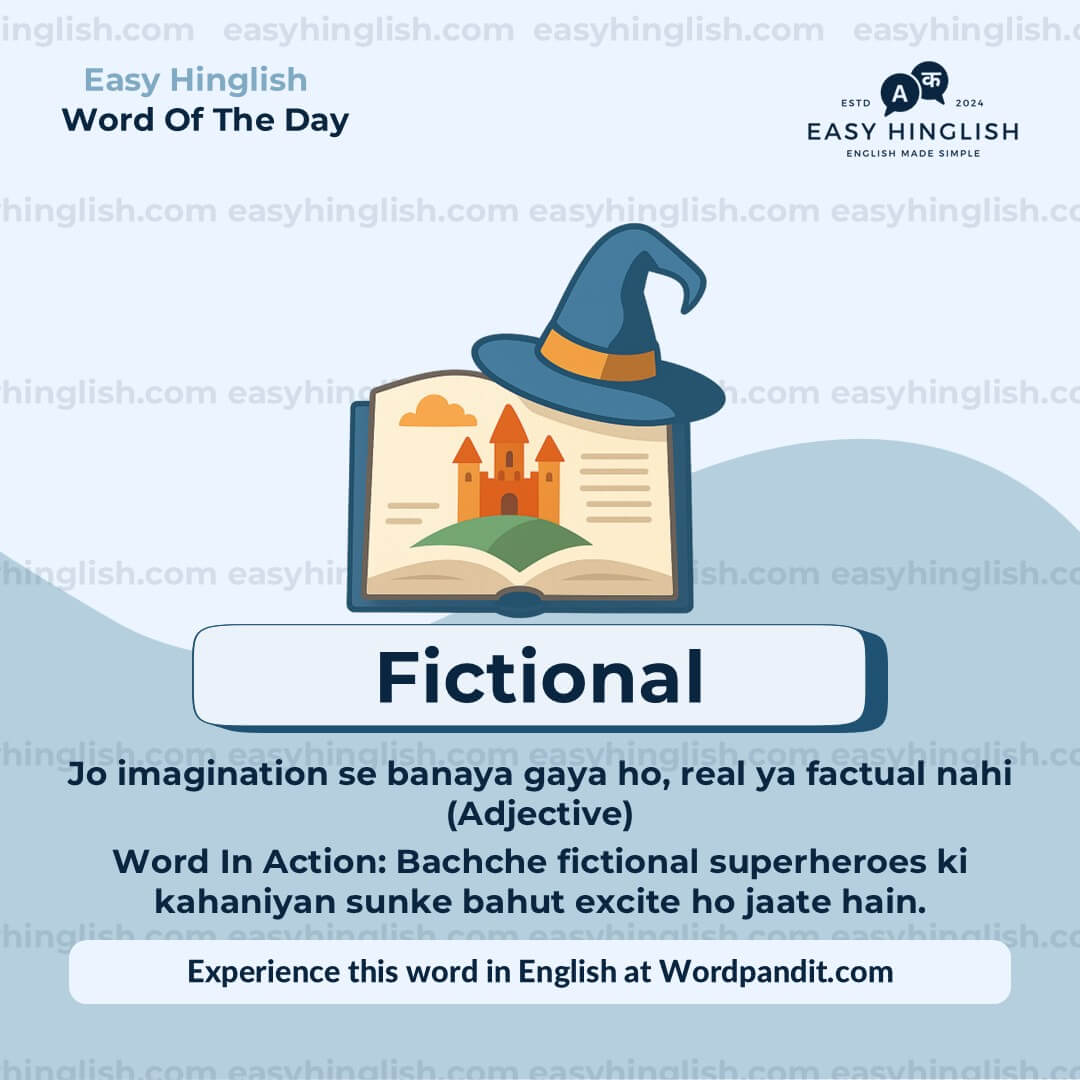Daily Vocabulary International Newspapers aur Publications se Seekho
Wordpandit ke Global Vocabulary Hub ke Saath Apni Vocabulary Expand Karo
Wordpandit par, hum aapko ek truly global vocabulary develop karne me madad karte hain, jo duniya ke sabse respected international publications se li gayi hoti hai. Yeh section aapko naye words se introduce karne ke liye design kiya gaya hai jo global conversations aur trends ko define karte hain.
Global Sources ka Power
Aapko globally sochne aur communicate karne me madad dene ke liye, hum vocabulary curate karte hain world ke top international sources se, jaise:
- The New York Times
- The Washington Post
- BBC
- The Guardian
- The Economist
- Scientific American
- Psychology Today
- Aur bhi bahut saare...
Globally Socho, Competitively Seekho
Hamare daily updates se aap international publications ke naye words seekhoge jo global news aur developments se jude hote hain. Isse aapki vocabulary current bhi rahegi aur globally relevant bhi.
Apni Global Soch Ko Expand Karo
Agar aap international exams ki tayari kar rahe ho, global business communication me excel karna chahte ho, ya sirf apni language skills improve karna chahte ho, toh Wordpandit aapko global level pe grow karne ke liye best resources provide karta hai.
Smart Learning, Global Reach
Hamari learning methodology me global examples, memory aids, aur interactive activities shamil hain, jo naye words ko effectively yaad karne aur real-world me use karne me madad karti hain.
Aaj Hi Apni Global Vocabulary Journey Shuru Karo!
Wordpandit Kyun Choose Karein?
Practical Learning: Aise words seekho jo real-world reading aur communication me aapko sach me kaam aayenge, taaki aapki comprehension aur bolne ki skills improve ho.
Diverse Content: Current affairs se lekar scientific breakthroughs tak, hamare different sources aapko multiple domains ki vocabulary seekhne ka moka dete hain.
Effortless Integration: Wordpandit ko apni daily routine ka part banao. Sirf kuch minute har din dene se aapki vocabulary time ke saath kaafi improve ho sakti hai.
Vocabulary Mastery Tak Ka Aapka Safar
- Regularly hamare Daily Vocabulary section ko visit karo
- Naye words explore karo aur unka context me use samjho
- In words ko apni writing aur bolne ki practice me use karne ki koshish karo
- Jaise-jaise aapke words badhte hain, apni progress ko track karo
Aaj Hi Apni Vocabulary Journey Shuru Karo!
Wordpandit ke saath vocabulary improve karna start karo. Roz thoda effort dalne se aap ek strong vocabulary develop kar sakte ho jo academic, professional, aur personal life me kaafi kaam aayegi.
Yaad rakho, ek naya shabd roz seekhna linguistic limitations ko door karne ka best tareeka hai! Wordpandit ko apni daily learning journey ka sathi banao aur vocabulary excellence ki taraf badho!
WORD-1: Ruinous
Sandarbh (Context):
"This article unpacks each of Plato's five systems, and the forces of politics and human nature that drive all democracies (and all other forms of government) into ruinous mob rule." - theculturist
Vyakhya (Explanatory Paragraph):
Ruinous ka matlab hai 'barbadi laane wala ya tabahi karne wala'—jab koi cheez itni destructive ho ki complete destruction ya serious harm cause kare. Yeh word tab use hota hai jab kisi decision, policy, situation ya action ke consequences bahut harmful aur devastating hon. Ruinous ko formal writing, economics, political analysis aur competitive exam passages mein use karte hain jab long-term damage ya financial/social collapse describe karna ho. CAT aur GRE reading comprehension mein yeh word aksar critical arguments mein milta hai.
Arth (Meaning): tabahi laane wala, barbadi karne wala, causing complete destruction or serious harm (Adjective)
Uccharan (Pronunciation): ROO-in-us (रूइनस)
Kathinai Star (Difficulty Level): ⭐⭐ Basic se Intermediate
Utpatti (Etymology): Ruinous Latin word 'ruina' se aaya hai jiska matlab hai 'collapse ya fall,' aur phir 'ruin' (destruction) ke through English mein aaya. Yeh word originally physical buildings ke collapse ke liye use hota tha, lekin ab iska meaning expand hokar financial, social aur political destruction tak pahunch gaya hai. Modern usage mein ruinous specially economic disasters aur harmful policies ke liye common ho gaya hai.
Prashant Sir Ke Tathya (Prashant Sir's Notes):
Bahut students ruinous ko 'harmful' ya 'damaging' se confuse karte hain—dono negative hain, lekin ruinous ka impact level bahut zyada serious hai, complete destruction tak jata hai. CAT aur GRE ke students ke liye, ruinous aksar economics aur political passages mein dikhta hai jahan policies ya decisions ke catastrophic consequences discuss hote hain. Ruinous ka sahi istemal kaise karein: yeh typically 'ruinous consequences,' 'ruinous costs,' ya 'ruinous policies' jaise collocations mein milta hai. Indian newspapers mein aapko 'ruinous debt' ya 'ruinous wars' aksar economic analysis articles mein milega—yeh signals karta hai ki situation recovery point se pare ja chuki hai.
Samanarthi & Vipritarthi (Synonyms & Antonyms):
Samanarthi (Synonyms): destructive, devastating, catastrophic, disastrous, calamitous, damaging, harmful, pernicious, tabahi karne wala, vināshkārī
Vipritarthi (Antonyms): beneficial, constructive, helpful, advantageous, profitable, lābhdāyak
Udaharan (Usage Examples):
- Government ki ruinous economic policies ne desh ko recession mein dhakel diya aur lakhs of jobs barbad ho gayi.
- Rajesh ne apni business expansion ke liye ruinous loans liye jo ultimately company ko bankruptcy tak le gaye.
- Historians argue karte hain ki prolonged wars financially ruinous hote hain aur empires ko collapse kar dete hain.
- Priya ki shopping addiction ruinous ho gayi thi—usne credit cards par itna kharcha kar diya ki debt repay karna impossible ho gaya.
Sanskritik Sandarbh (Cultural Reference):
"Bahut baar over-ambition ruinous decisions lead karti hai—chahe woh Mahabharata ka Kurukshetra war ho ya modern politics mein leaders ki power-hungry policies." - Indian historical analysis
Sochiye (Think About It):
Kya aapne apne life mein koi ruinous decision dekha hai jo short-term benefit ke liye liya gaya tha lekin long-term mein complete disaster ban gaya?
Chhoti Kriya (Quick Activity):
Aaj ke newspaper mein do articles dhoondhein jahan 'ruinous' ya uske synonyms use hue hon—economics ya politics section check karein. Notice karein ki context kya hai aur consequences kitne serious describe kiye gaye hain.
Yaad Karne Ka Tarika (Memory Tip):
'Ruinous' ko aise yaad rakhein: 'RUIN' (barbadi) + 'OUS' (full of)—matlab 'barbadi se bhara hua.' Imagine karein ek ruined building jo collapse ho gayi hai—woh visual image ruinous word ko yaad rakhne mein help karegi. Ya socho 'ruin us' (hume barbad kar do)—ruinous cheezein literally humein ruin kar deti hain.
Vastavik Jeevan Me Upyog (Real-World Application):
Business reports, economic analysis, aur policy critique articles mein 'ruinous' commonly use hota hai serious financial ya strategic mistakes describe karne ke liye. Corporate communication mein iska use karte hain jab risky decisions ke potentially devastating outcomes ke bare mein warn karna ho. Competitive exams ke essay writing mein ruinous effective word hai jab historical failures, economic crises, ya policy disasters analyze karne hon—yeh immediately reader ko severity samajh aa jati hai.
WORD-2: Captivated
Sandarbh (Context):
"...coming of age in the Pleistocene world, completely captivated me." - The Atlantic
Vyakhya (Explanatory Paragraph):
Captivated ka matlab hai kisi cheez ya person se itna fascinate hona ki aapka poora dhyan uspe focus ho jaye aur aap usse door nahi ho sakte. Yeh word tab use hota hai jab koi book, performance, idea ya person aapko itna attract kare ki aap uske baare mein sochna band nahi kar sakte. Captivated ko book reviews, film critiques aur competitive exam passages mein use karte hain jab intense engagement ya complete fascination dikhana ho.
Arth (Meaning): Kisi ka dhyan aur interest poori tarah attract aur hold karna (Verb, past tense/past participle)
Uccharan (Pronunciation): KAP-tih-vay-ted (कैप्टिवेटेड)
Kathinai Star (Difficulty Level): ⭐⭐ Basic se Intermediate
Utpatti (Etymology): Captivated Late Latin word 'captivare' se aaya hai jiska matlab hai 'to take captive,' jo 'captivus' (prisoner) se bana hai. 16th century mein yeh word literal imprisonment ke liye use hota tha, lekin gradually iska meaning evolve hua. 18th century tak yeh metaphorically use hone laga—physical captivity se emotional aur intellectual captivity mein transform ho gaya, jahan charm ya fascination tumhe 'prisoner' bana le.
Prashant Sir Ke Tathya (Prashant Sir's Notes):
Students aksar poochhte hain: captivated aur fascinated mein kya farak hai? Dono strong interest dikhate hain, lekin captivated ka matlab hai ki aap completely held ya entranced ho—aap break away nahi kar sakte—jabki fascinated mein intense curiosity hoti hai lekin aap step back kar sakte ho. CAT aur GRE ke reading comprehension passages mein captivated aksar literary contexts mein dikhta hai jahan characters art, nature ya logon ke reactions describe ho rahe hote hain. Indian newspapers mein aapko "audiences were captivated by the performance" ya "readers captivated by the narrative" milega—notice karein ki yeh emphasize karta hai jo captivate kar raha hai uski power ko, sirf observer ki interest ko nahi. Captivated ka sahi istemal kaise karein: yeh hamesha complete absorption signal karta hai, jo RC tone questions ke liye crucial hai.
Samanarthi & Vipritarthi (Synonyms & Antonyms):
Samanarthi (Synonyms): fascinated, enchanted, entranced, mesmerized, spellbound, charmed, engrossed, absorbed, enthralled, bewitched, मोहित
Vipritarthi (Antonyms): bored, disinterested, repelled, unimpressed, indifferent, distracted
Udaharan (Usage Examples):
- Mumbai ka audience A.R. Rahman ke live performance se completely captivated ho gaya tha, songs ke beech absolute silence mein baithe the har note absorb karne ke liye.
- Meera Khajuraho ke ancient temples se captivated reh gayi, ghanton tak intricate sculptures examine karti rahi jo centuries purani kahaniyan sunate the.
- Chhote students visiting scientist ke demonstration se captivated ho gaye, unki aankhen chamak uthi jab chemical reactions ne colorful flames aur unexpected transformations produce kiye.
- Rajesh apne colleague ki artificial intelligence presentation se itna captivated ho gaya ki poore hour phone check karna bhool gaya.
Sanskritik Sandarbh (Cultural Reference):
"Shah Rukh Khan ki charm ne generations tak audiences ko captivated rakha hai, jisse woh Bollywood ke sabse enduring superstars mein se ek ban gaye hain." - Indian film journalism mein common observation
Sochiye (Think About It):
Aakhri baar kaunsi book, movie ya experience thi jisne aapko completely captivate kar diya tha, aur aap time aur surroundings sab bhool gaye the?
Chhoti Kriya (Quick Activity):
Do sentences likhiye jismein describe karein jab aap kisi cheez se captivated hue the—koi performance, sunset, conversation ya art piece. Focus karein ki kya cheez ne aapka attention itna completely hold kiya.
Yaad Karne Ka Tarika (Memory Tip):
'Captivated' ko 'CAPTIVE-ated' ke roop mein socho—jab koi cheez aapko captivate karti hai, toh aap uski charm ka willing captive (kaid) ban jaate ho. Imagine karo ki beauty ya fascination ne tumhe prisoner bana liya hai, aur tum escape nahi karna chahte kyunki experience itna amazing hai. 'Captive' root yaad dilata hai ki yeh complete hold hone ke baare mein hai.
Vastavik Jeevan Me Upyog (Real-World Application):
Entertainment reviews, travel writing, educational contexts aur marketing mein captivated commonly use hota hai powerful engagement describe karne ke liye. Journalists iska use films, concerts ya performances review karte waqt karte hain yeh convey karne ke liye ki audience attention kitni effectively hold hui. Business presentations aur academic writing mein, describe karna ki kaise koi idea ya speaker ne audience ko captivated kiya exceptional communication effectiveness signal karta hai. Competitive exam essays aur RC passages ke liye, captivated ko recognize karna emotional intensity aur observer-subject ke beech power dynamics identify karne mein help karta hai.
WORD-3: Extinctions
Sandarbh (Context):
"...researched Pleistocene animal extinctions for science." - The Atlantic
Vyakhya (Explanatory Paragraph):
Extinctions ka matlab hai kisi species, group ya family ka poori tarah se khatam ho jana, jahan Earth par unka ek bhi living member nahi bachta. Yeh word tab use hota hai jab biology, paleontology ya environmental science mein species ke permanent disappearance ki baat ho. Extinctions ko scientific articles, environmental reports aur competitive exam passages mein use karte hain jab biodiversity loss, evolutionary history ya ecological changes discuss karni ho.
Arth (Meaning): Kisi species ya group ka complete aur permanent disappearance (Noun, plural form)
Uccharan (Pronunciation): ik-STINGK-shunz (एक्सटिंक्शन्स)
Kathinai Star (Difficulty Level): ⭐⭐⭐ Intermediate
Utpatti (Etymology): Extinctions Latin word 'extinctio' se aaya hai, jo 'extinguere' (to extinguish/put out) se derived hai. 'Ex' (out) aur 'stinguere' (to quench) combine hoke banaya gaya. 15th century mein yeh word originally fire ko bujhane ke liye use hota tha, lekin 17th-18th century mein biological context mein shift hua jab scientists ne realize kiya ki species permanently disappear kar sakti hain. Dinosaurs ke fossils ki discovery ne extinction ko mainstream scientific concept bana diya.
Prashant Sir Ke Tathya (Prashant Sir's Notes):
Bahut students extinction ko 'endangered' se confuse karte hain—farak yeh hai ki endangered species abhi bhi exist karti hain lekin risk mein hain, jabki extinction ka matlab hai species already permanently gone ho chuki hai, wapas nahi aa sakti. UPSC aur GRE ke environment-related passages mein extinctions aksar mass extinction events (jaise dinosaurs) ya current biodiversity crisis ke context mein appear hota hai. Extinctions ka sahi istemal kaise karein: yeh hamesha plural form mein multiple species ke liye ya singular 'extinction' ek species ke liye use hota hai. Indian context mein, jab newspapers "preventing extinctions" ya "sixth mass extinction" likhte hain, toh usually climate change, habitat loss aur human activity ki impact discuss ho rahi hoti hai. CAT RC passages mein extinction terminology author ki concern level aur urgency indicate karti hai.
Samanarthi & Vipritarthi (Synonyms & Antonyms):
Samanarthi (Synonyms): disappearance, elimination, eradication, annihilation, death, dying out, obliteration, termination, विलुप्ति, खात्मा
Vipritarthi (Antonyms): survival, preservation, conservation, continuation, proliferation, growth, revival
Udaharan (Usage Examples):
- Scientists ke according, climate change ke karan hum currently sixth mass extinction face kar rahe hain jismein thousands of species permanently disappear ho rahi hain.
- Pleistocene era ke animal extinctions ne researchers ko help ki yeh samajhne mein ki kaise human activity aur environmental changes combined effect create karte hain.
- Indian cheetah ka extinction 1952 mein officially declare hua tha, aur ab government Namibia se cheetahs laakar reintroduction program chal raha hai.
- Professor Sharma ne lecture mein explain kiya ki dinosaurs ke extinctions ke baad mammals ne Earth par dominate karna shuru kiya tha.
Sanskritik Sandarbh (Cultural Reference):
"Dodo bird ki extinction story har bachche ko pata hai—yeh remind karti hai ki human carelessness kaise entire species ko forever khatam kar sakti hai." - Popular reference in environmental education
Sochiye (Think About It):
Agar hum current rate par species extinctions continue karein, toh future generations ke liye Earth kaisi hogi—aur kya hum abhi bhi isse reverse kar sakte hain?
Chhoti Kriya (Quick Activity):
Aaj ke newspaper ya online news mein koi ek article dhoondhein jo endangered species ya extinctions ke baare mein ho. Note karein ki kaunsi species risk mein hain aur kyun. Ek sentence likhein summarizing the main threat.
Yaad Karne Ka Tarika (Memory Tip):
'Extinctions' ko aise yaad rakhein: 'EX-TINCT-ions'—'EX' matlab 'out/bahar,' aur 'TINCT' ko 'EXTINCT' se connect karo jiska matlab hai 'finished/khatam.' Imagine karo ki koi species OUT ho gayi, completely FINISHED—jaise fire extinguisher se aag 'extinct' ho jaati hai, waise hi species bhi extinct ho jaati hai aur wapas nahi aati.
Vastavik Jeevan Me Upyog (Real-World Application):
Scientific research papers, environmental policy documents, aur conservation reports mein extinctions regularly use hota hai biodiversity loss describe karne ke liye. Wildlife documentaries aur educational content mein extinct species ki history explain karte waqt yeh term essential hai. News journalism mein climate change articles, habitat destruction stories aur conservation efforts cover karte waqt extinctions ka reference dena standard practice hai. UPSC environment syllabus mein mass extinction events, current extinction crisis aur India ke extinct/endangered species ke baare mein questions aate hain, isliye yeh term thoroughly samajhna zaroori hai competitive exams ke liye.
WORD-4: Influenced
Context:
"While The Clan of the Cave Bear is not responsible for my career path, it definitely influenced it." - The Atlantic
Explanatory Paragraph:
Influenced meaning in English is 'to have an effect on the character, development, or behavior of someone or something.' This word is used when describing how one person, event, idea, or experience shapes or affects another in some meaningful way. How to use influenced correctly: it appears frequently in biographical writing, literary analysis, and competitive exam passages discussing factors that shape decisions, beliefs, careers, or creative works.
Meaning: To have affected or shaped someone's thoughts, actions, or development (Verb, past tense/past participle)
Pronunciation: IN-floo-ensd
Difficulty Level: ⭐⭐ Basic to Intermediate
Etymology: Influenced comes from Medieval Latin 'influentia' meaning 'a flowing in,' derived from Latin 'influere' (to flow in), formed from 'in' (into) and 'fluere' (to flow). Originally used in astrology during the 14th century to describe the supposed ethereal fluid flowing from stars affecting human destiny, the word evolved by the 16th century to mean any power affecting people or events. The metaphor of influence as something flowing into and changing a person has persisted, making it one of the most versatile words for describing impact and effect.
Prashant Sir's Notes:
Students often ask: what is the difference between influenced and affected? While both indicate impact, influenced specifically suggests shaping thoughts, decisions, or development over time, while affected can be more immediate and doesn't always involve decision-making. For CAT and GRE reading comprehension, influenced usage typically signals cause-and-effect relationships—authors use it to explain why characters made choices or how ideas developed. In Indian English writing, you'll commonly see "influenced by Gandhian philosophy" or "influenced by Western education," showing how one thing shapes another. When analyzing RC passages for competitive exams, identifying what influenced whom helps you understand motivations, trace argument development, and answer inference questions about causation.
Synonyms & Antonyms:
Synonyms: affected, shaped, impacted, swayed, guided, inspired, directed, determined, molded, persuaded
Antonyms: unaffected, independent, unswayed, resistant, immune, unchanged, autonomous
Usage Examples:
- Ravi's decision to study medicine was heavily influenced by his grandfather, a rural doctor who dedicated his life to serving villages in Bihar.
- Indian classical music has influenced countless contemporary artists worldwide, blending ancient ragas with modern genres to create unique soundscapes.
- The startup's business strategy was influenced by Silicon Valley models, though they adapted it to suit Indian market conditions and consumer behavior.
- Priya's teaching style was influenced by her own struggles as a student, making her particularly empathetic toward children who found learning difficult.
Cultural Reference:
"Satyajit Ray's films were deeply influenced by Italian neorealism, yet remained uniquely Bengali in their storytelling and emotional depth." - Common observation in Indian cinema studies
Think About It:
Who has influenced you the most in your life, and how would your choices and personality be different if you had never encountered that person or experience?
Quick Activity:
Write two sentences about a book, teacher, family member, or experience that influenced an important decision you made. Be specific about how that influence shaped your thinking.
Memory Tip:
Think of 'Influenced' as 'IN-FLOW-enced'—imagine ideas or effects flowing IN to a person like water flowing into a container, gradually filling it and changing its content. The Latin root 'fluere' means 'to flow,' so influence is something that flows into you and shapes who you become.
Real-World Application:
Influenced is commonly used in biographies, academic papers, marketing analysis, and political commentary to explain causation and development. Journalists use it when profiling successful individuals to explain their journey, while businesses analyze what influenced consumer behavior and purchasing decisions. In CAT RC passages and GRE reading sections, influenced frequently appears in cause-effect relationships, helping readers understand character motivations or trace intellectual development. For UPSC essay writing, discussing what influenced historical figures or social movements demonstrates analytical depth and understanding of interconnected factors shaping events.
WORD-5: Fictional
Sandarbh (Context):
"Fiction set in the deep past, like The Clan of the Cave Bear, is rarely mentioned in introductory classes." - The Atlantic
Vyakhya (Explanatory Paragraph):
Fictional ka matlab hai jo real nahi hai balki imagination se create kiya gaya hai, jaise stories, characters ya events jo actually exist nahi karte. Yeh word tab use hota hai jab kisi made-up content ko real facts ya historical truth se distinguish karna ho. Fictional ko literary criticism, academic writing aur competitive exam passages mein use karte hain jab fiction aur non-fiction ke beech difference clarify karni ho, ya creative works discuss karni ho.
Arth (Meaning): Jo imagination se banaya gaya ho, real ya factual nahi (Adjective)
Uccharan (Pronunciation): FIK-shuh-nul (फिक्शनल)
Kathinai Star (Difficulty Level): ⭐⭐ Basic se Intermediate
Utpatti (Etymology): Fictional Latin word 'fictio' se aaya hai jiska matlab hai 'a fashioning or feigning,' jo 'fingere' (to shape, form, devise) se derived hai. 17th century mein 'fiction' word literature mein enter hua invented stories ke liye. 19th century tak 'fictional' adjective form commonly use hone laga jab novels aur creative writing ne popularity gain ki. Yeh word originally 'pretense' ya 'deception' ka sense rakhta tha, lekin ab neutral ya positive connotation hai creative storytelling ke context mein.
Prashant Sir Ke Tathya (Prashant Sir's Notes):
Bahut students fictional ko fictitious se confuse karte hain—dono ka basic matlab similar hai lekin usage different hai. Fictional neutral word hai jo stories, characters aur works describe karta hai jo deliberately imagination se create kiye gaye hain (jaise "fictional character Sherlock Holmes"), jabki fictitious aksar negative connotation rakhta hai aur false information ya deceptive claims ke liye use hota hai (jaise "fictitious bank account"). CAT aur GRE ke literary passages mein fictional aksar historical fiction, biographical novels ya creative adaptations discuss karte waqt dikhta hai. Fictional ka sahi istemal kaise karein: yeh typically "fictional character," "fictional narrative," ya "fictional world" jaise phrases mein aata hai. Indian English context mein, jab critics "fictional representation of Partition" ya "fictional portrayal of village life" bolte hain, toh woh acknowledge kar rahe hain ki story creative interpretation hai, documentary nahi. RC passages mein fictional vs factual distinction identify karna author's purpose samajhne ke liye critical hai.
Samanarthi & Vipritarthi (Synonyms & Antonyms):
Samanarthi (Synonyms): imaginary, invented, made-up, fabricated, fictitious, unreal, created, kalpana-based, काल्पनिक
Vipritarthi (Antonyms): real, factual, actual, true, genuine, historical, non-fictional, documentary, authentic
Udaharan (Usage Examples):
- Amish Tripathi ki Shiva Trilogy ek fictional account hai jo ancient Indian mythology ko modern storytelling ke saath blend karti hai.
- Professor ne explain kiya ki historical novels mein fictional characters ko real events ke beech place kiya jaata hai narrative ko engaging banane ke liye.
- Netflix series Sacred Games ki fictional plot Mumbai underworld ki realities se inspired thi lekin characters aur events imaginary the.
- Students ko samajhna chahiye ki exam passages mein fictional excerpts interpretation demand karte hain jabki factual passages comprehension test karte hain.
Sanskritik Sandarbh (Cultural Reference):
"Devdas ek timeless fictional character hai jo Sarat Chandra Chattopadhyay ne create kiya, lekin Indian cinema ne use itni baar adapt kiya ki woh almost real personality lagta hai." - Common observation in Indian literary discussions
Sochiye (Think About It):
Kya fictional stories real history se zyada powerful tareeke se important truths aur emotions convey kar sakti hain, ya factual accounts hamesha zyada authentic hote hain?
Chhoti Kriya (Quick Activity):
Apni favourite fictional character ke baare mein do sentences likhiye aur explain kariye ki woh character aapko kyun relatable lagta hai, chahe woh completely imaginary hi kyun na ho. Think about books, movies, ya web series.
Yaad Karne Ka Tarika (Memory Tip):
'Fictional' ko aise yaad rakhein: 'FIC-tion-al' mein 'FIC' ko 'FIX' se connect karo—jab writer story 'fix' ya create karta hai apne imagination se, toh woh fictional ho jaati hai. Ya phir 'FICTION-al' = 'FICTION ka' matlab imagination ka creation. Jaise carpenter wood se furniture fix karta hai, waise writer imagination se fictional stories fix karta hai!
Vastavik Jeevan Me Upyog (Real-World Application):
Book reviews, literary criticism aur academic papers mein fictional commonly use hota hai genres classify karne aur creative works analyze karne ke liye. Media literacy discussions mein fictional vs real content distinguish karna increasingly important ho gaya hai social media era mein. Film aur web series reviews mein "fictional narrative," "fictional universe," ya "fictional biopic" jaise terms regularly use hote hain. Competitive exams ke essay topics mein "role of fictional literature in society" ya "fictional vs non-fictional accounts of history" standard questions hain. Legal contexts mein bhi "fictional name" ya "fictional scenario" terms disclaimer ke liye use hote hain.



